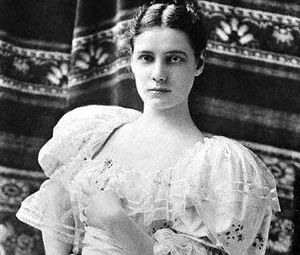Annotation:Nelly Bly: Difference between revisions
No edit summary |
No edit summary |
||
| (9 intermediate revisions by 3 users not shown) | |||
| Line 1: | Line 1: | ||
---------- | |||
---- | {{TuneAnnotation | ||
|f_tune_annotation_title= https://tunearch.org/wiki/Annotation:Nelly_Bly > | |||
'''NELLY BLY.''' American, "Sand Jig" (4/4 or 2/4 time). USA, Michigan. G Major (Kerr): C Major (Shaw): D Major (Johnson, Sweet). Standard tuning (fiddle). AAB (Kerr): AABB (Johnson, Shaw, Sweet). Nelly Bly [http://en.wikipedia.org/wiki/Nellie_Bly] (1864-1922) was born Elizabeth Jane Cochran and took her pen name from a Stephen Foster song. She was a famous muck-raking reporter in the latter 19th century for the New York newspaper The World. In 1889 the paper sent her on a round-the-world trip where she journeyed for 72 days, 6 hours and 11 minutes by train, ship, rickshaw and burro. | |f_annotation='''NELLY BLY.''' American, "Sand Jig" (4/4 or 2/4 time). USA, Michigan. F Major (Person): G Major (Kerr): C Major (Shaw): D Major (Johnson, Sweet). Standard tuning (fiddle). AAB (Kerr): AABB (Johnson, Person, Shaw, Sweet). Nelly Bly [http://en.wikipedia.org/wiki/Nellie_Bly] (1864-1922) was born Elizabeth Jane Cochran and took her pen name from a Stephen Foster (1826-1864) song [http://en.wikisource.org/wiki/Nelly_Bly]. She was a famous muck-raking reporter in the latter 19th century for the New York newspaper The World. In 1889 the paper sent her on a round-the-world trip where she journeyed for 72 days, 6 hours and 11 minutes by train, ship, rickshaw and burro. | ||
[[File:nelliebly. | [[File:nelliebly.jpeg|300px|thumb|left|Nellie Bly/Elizabeth Cochran]] | ||
<br> | <br> | ||
<br> | <br> | ||
Stephen Foster's song entered minstrel tradition | Stephen Foster's song, penned Pennsylvania in 1850 while he was under contract with Christy's Minstrels, entered minstrel tradition, and was one of his few upbeat productions. Scott records that it was "one of the 'Negro' songs sung by the troupes which followed (in England) in the wake of the Ethiopian Serenaders." | ||
<blockquote> | <blockquote> | ||
''Nelly Bly, Nelly Bly, bring de broom along,''<br> | ''Nelly Bly, Nelly Bly, bring de broom along,''<br> | ||
| Line 16: | Line 16: | ||
''Jest gib de mush a turn.'' .... [Steven Foster] <br> | ''Jest gib de mush a turn.'' .... [Steven Foster] <br> | ||
</blockquote> | </blockquote> | ||
The tune was used as part of “The San Francisco Quadrilles,” published in San Francisco in 1852. In 1857 members of a wagon train on the way to Colorado danced to fiddler Oliver Thompson Hamlin singing and playing it, and it is still a common square dance tune. | |||
|f_source_for_notated_version= | |||
|f_printed_sources=Johnson ('''The Kitchen Musician's No. 7: Michigan Tunes, vol. 7'''), 1986-87; p. 3. Kerr ('''Merry Melodies, vol. 2'''), c. 1880's; No. 406, p. 45. [[biography:Mrs. Joe Person]] ('''A Collection of Popular Airs'''), 1889; p. 8. Scott ('''English Song Book'''), 1926; p. 80. Shaw ('''Cowboy Dances'''), 1943; p. 384. Sweet ('''Fifer's Delight'''), 1965/1981; p. 10. | |||
|f_recorded_sources=Voyager 371 - Phil and Vivian Williams "Pioneer Dance Tunes of the Far West" (2006). | |||
|f_see_also_listing= | |||
}} | |||
------------- | |||
---- | |||
Latest revision as of 19:33, 4 October 2022
X:1 T:Nelly Bly M:C L:1/8 R:Sand Jig S:Kerr - Merry Melodies, vol. 2 (c. 1880's, No. 406) Z:AK/Fiddler's Companion K:G Bc d2 Bc d2|Bcde A4|Bc d2 ef g2|fgaf g2d2:| b2 (3ggg g2e2|dBBG A4|Bcd2 ef g2|fgag g2d2| b2 (3ggg g2e2|dBBG A4|Bc d2 efg2|fgaf g2z2||
NELLY BLY. American, "Sand Jig" (4/4 or 2/4 time). USA, Michigan. F Major (Person): G Major (Kerr): C Major (Shaw): D Major (Johnson, Sweet). Standard tuning (fiddle). AAB (Kerr): AABB (Johnson, Person, Shaw, Sweet). Nelly Bly [1] (1864-1922) was born Elizabeth Jane Cochran and took her pen name from a Stephen Foster (1826-1864) song [2]. She was a famous muck-raking reporter in the latter 19th century for the New York newspaper The World. In 1889 the paper sent her on a round-the-world trip where she journeyed for 72 days, 6 hours and 11 minutes by train, ship, rickshaw and burro.

Stephen Foster's song, penned Pennsylvania in 1850 while he was under contract with Christy's Minstrels, entered minstrel tradition, and was one of his few upbeat productions. Scott records that it was "one of the 'Negro' songs sung by the troupes which followed (in England) in the wake of the Ethiopian Serenaders."
Nelly Bly, Nelly Bly, bring de broom along,
We'll sweep de kitchen clean, my dear,
And hab a little song.
Poke de wood, my lady lub,
An' make de fire burn,
An' while I take de Banjo down
Jest gib de mush a turn. .... [Steven Foster]
The tune was used as part of “The San Francisco Quadrilles,” published in San Francisco in 1852. In 1857 members of a wagon train on the way to Colorado danced to fiddler Oliver Thompson Hamlin singing and playing it, and it is still a common square dance tune.

